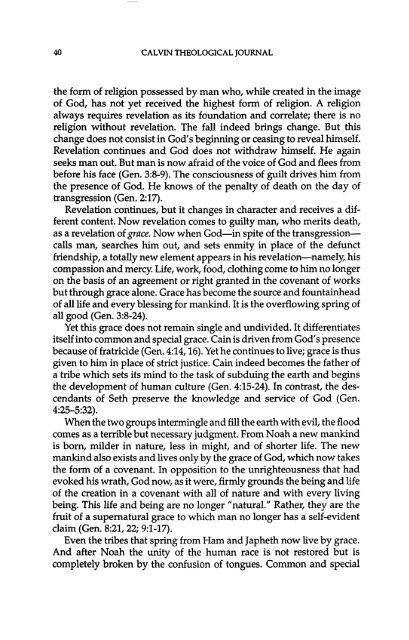Herman-Bavinck-Common-Grace
You also want an ePaper? Increase the reach of your titles
YUMPU automatically turns print PDFs into web optimized ePapers that Google loves.
40 CALVIN THEOLOGICAL JOURNAL<br />
the form of religion possessed by man who, while created in the image<br />
of God, has not yet received the highest form of religion. A religion<br />
always requires revelation as its foundation and correlate; there is no<br />
religion without revelation. The fall indeed brings change. But this<br />
change does not consist in God's beginning or ceasing to reveal himself.<br />
Revelation continues and God does not withdraw himself. He again<br />
seeks man out. But man is now afraid of the voice of God and flees from<br />
before his face (Gen. 3:8-9). The consciousness of guilt drives him from<br />
the presence of God. He knows of the penalty of death on the day of<br />
transgression (Gen. 2:17).<br />
Revelation continues, but it changes in character and receives a different<br />
content. Now revelation comes to guilty man, who merits death,<br />
as a revelation of grace. Now when God—in spite of the transgression—<br />
calls man, searches him out, and sets enmity in place of the defunct<br />
friendship, a totally new element appears in his revelation—namely, his<br />
compassion and mercy. Life, work, food, clothing come to him no longer<br />
on the basis of an agreement or right granted in the covenant of works<br />
but through grace alone. <strong>Grace</strong> has become the source and fountainhead<br />
of all life and every blessing for mankind. It is the overflowing spring of<br />
all good (Gen. 3:8-24).<br />
Yet this grace does not remain single and undivided. It differentiates<br />
itself into common and special grace. Cain is driven from God's presence<br />
because of fratricide (Gen. 4:14,16). Yet he continues to live; grace is thus<br />
given to him in place of strict justice. Cain indeed becomes the father of<br />
a tribe which sets its mind to the task of subduing the earth and begins<br />
the development of human culture (Gen. 4:15-24). In contrast, the descendants<br />
of Seth preserve the knowledge and service of God (Gen.<br />
4:25-5:32).<br />
When the two groups intermingle and fill the earth with evil, the flood<br />
comes as a terrible but necessary judgment. From Noah a new mankind<br />
is born, milder in nature, less in might, and of shorter life. The new<br />
mankind also exists and lives only by the grace of God, which now takes<br />
the form of a covenant. In opposition to the unrighteousness that had<br />
evoked his wrath, God now, as it were, firmly grounds the being and life<br />
of the creation in a covenant with all of nature and with every living<br />
being. This life and being are no longer "natural." Rather, they are the<br />
fruit of a supernatural grace to which man no longer has a self-evident<br />
claim (Gen. 8:21, 22; 9:1-17).<br />
Even the tribes that spring from Ham and Japheth now live by grace.<br />
And after Noah the unity of the human race is not restored but is<br />
completely broken by the confusion of tongues. <strong>Common</strong> and special



